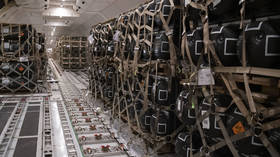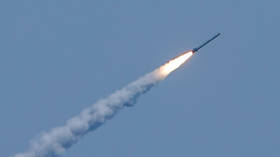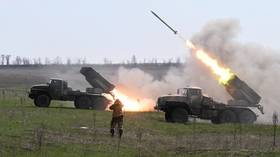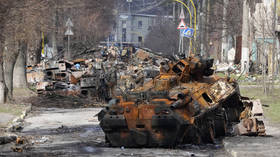Meo Meo
Friday, May 9, 2025
TƯ TƯỞNG ME TÂY, ME MỸ TRONG QUAN CHỨC CHÍNH QUYỀN
Saturday, June 11, 2022
How a century of political violence in Ukraine is linked to the atrocities of today
For many, graphic footage of Russian servicemen tortured and killed by the Ukrainian Armed Forces, and nationalist battalions, came as a real shock. But this did not surprise those who are familiar with the ‘traditions’ of Ukraine’s ‘fighters for national freedom’, as they have more than a century of history in this sort of thing.
Europe’s First Concentration Camps
The first concentration camps in Europe – Terezin and Thalerhof – were established in Austria-Hungary in the fall of 1914, not to hold prisoners of war, but the empire’s own citizens. This is how Vienna, then the ‘sick man of Europe’, tried to protect its eastern border areas from members of its population which sympathized with neighboring Russia. Fighting between the two countries had broken out just before the beginning of the First World War. Austria-Hungary’s last emperor, Charles I, confessed in his edict of May 7, 1917, “All the arrested Russians are innocent, but they were detained to prevent them becoming guilty.”
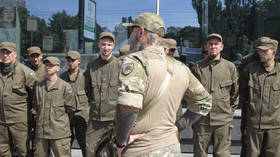
People from Galicia who did not want to call themselves Ukrainians, as the Austrian authorities insisted, and continued to use the name ‘Rusyns’, were arrested and incarcerated in two places – in a garrison fortress in Terezin and in a valley near Graz, the capital of Styria. While the prisoners in Terezin were held in the vaults and dungeons of the fortress, with the support of local Czechs, the concentration camp later known as Thalerhof was little more than a bare field fenced in with barbed wire.
Today, most of Galicia is in Western Ukraine and the largest city is Lviv, which was known as Lemberg by the Austrians and Lvov by the Soviets and Polish.
The initial prisoners were brought there in September of 1915, and the first barracks began to be built only at the beginning of the following year. Prior to that, the people were forced to lie in the open in the rain and cold. According to US Congressman Joseph McCormick, the prisoners were often beaten and tortured. (Terrorism in Bohemia; Medill McCormick Gets Details of Austrian Cruelty. ‘New York Times’, December 16, 1917)
According to the memoirs of those who survived the inhumane conditions (about 20,000 prisoners passed through the camp), 3,800 people were executed in the first half of 1915 alone, and 3,000 people died from the horrific conditions and diseases in a year and a half. Vasily Varvik, a writer, poet, literary critic, and historian who endured Thalerhof’s hell describes the atrocities in the internment camp as follows: “In order to intimidate people, to prove their power over us, the prison authorities drove poles into the ground all over Thalerhof Square, on which brutally beaten martyrs often hung in unspoken torment.”
What do the Ukrainians have to do with it? The fact is that Ukrainian nationalists were specially recruited to guard the Thalerhof camp. According to numerous testimonies, the arrested, which comprised nearly the entire Russian intelligentsia of Galicia and thousands of peasants, were also escorted to the camp by the Ukrainians.
Indeed, descriptions given in the Thalerhof Almanac detail how Ukrainian Sichoviki in the Carpathian village of Lavochnoye tried to bayonet the prisoners, among whom there was not a single Russian, but only their fellow Galicians.
It was the Ukrainian nationalists who were the concentration camp guards’ cruelest torturers and murderers. “In the end, the atrocities committed by the Germans do not equate to the victimization of your own people. A soulless German could not get his iron boots so deeply into the soul of a Slavonic Rusyn as well as a Rusyn who called himself a Ukrainian,” wrote Vasily Varvik.
From the Volyn Massacre to 1954
At the end of February 1943, the ‘revolutionary’ wing of the Organization of Ukrainian Nationalists (OUP), headed by the current idol of many Ukrainians, Stepan Bandera, decided to create the so-called ‘Ukrainian Insurgent Army’ (UPA) to ‘fight the advancing Red Army’, which was driving the Nazis from the country. But the first detachments that emerged in March and April, of the same year, began to fight not the Soviets, whose troops were still waiting for the Nazis to strike near Kursk, but Polish peasants in territory that had belonged to Warsaw up until 1939. These events, which lasted for more than six months, were called the ‘Volyn Massacre’. UPA detachments and units from the SS Galicia division, which was made up of locals from the eponymous area, killed from 40,000 to 200,000 people, according to various estimates. The Polish Sejm and Senate put the number of victims at approximately 100,000 people, and July 11 is recognized as a ‘National Day of Remembrance of the Victims of the Genocide of Polish Citizens by Ukrainian Nationalists’
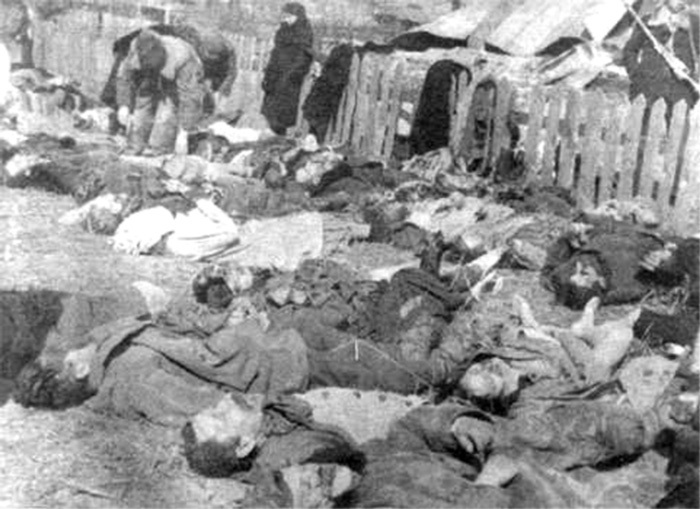
The Polish ‘Association of Memory of Victims of Crimes of Ukrainian Nationalists’ (Stowarzyszenie Upamiętnienia Ofiar Zbrodni Ukraińskich Nacjonalistów (SUOZUN)) is engaged in reconstructing the course of events surrounding the Volyn Massacre. The materials collected by SUOZUN reveal shocking details with respect to the cruelty with which Ukrainian nationalists dealt with even babies and pregnant women. Polish researchers have uncovered 135 methods of torture and murder practiced by Ukrainian nationalists. Among them are:
- Running children through with stakes
- Cutting a person’s throat and pulling their tongue out through the hole
- Sawing a person’s torso in half with a carpenter’s saw
- Cutting open the belly of a woman in an advanced stage of pregnancy, removing the fetus, and replacing it with a live cat, before sewing up her abdomen.
- Cutting open a pregnant women’s abdomen and pouring in broken glass
- Nailing a small child to a door.
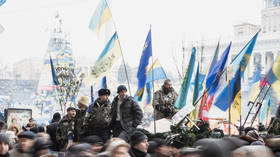
According to Polish historians, it came to the point that even the German butchers, having been shocked by these atrocities, began to protect the Poles from the Ukrainian Sokirniki (from the Ukrainian word sokira, meaning ‘axe’).
All this, including the ingenuity employed in conducting torture and executions, continued after the Nazis had been expelled from Ukraine. Only now the victims of the nationalists were citizens of Soviet Ukraine – specialists like agronomists, engineers, doctors, and teachers who had been sent from the eastern part of the republic to restore western Ukraine after the war. Though the vast majority of these were ethnic Ukrainians, the nationalists killed not only them, but even their own fellow villagers who had cooperated with the Soviets.
These acts were carried out in accordance with instructions given by the head of the UPA and former Wehrmacht hauptman Roman Shukhevich, who is now an idol for many Ukrainians: “The OUN should act so that all those who recognized the Soviet government are destroyed. Not intimidated, but physically destroyed! Do not be afraid that people will curse us for cruelty. Let half of the 40 million Ukrainian population remain – there is nothing terrible in this,” he wrote. (Tchaikovsky A., Nevidoma viina, K., 1994, p. 224). According to the KGB of the USSR, in 1944–1953, the irretrievable losses of the Soviet side were 30,676 people. Among them are 697 employees of state security agencies, 1,864 employees of the Ministry of Internal Affairs, 3,199 military personnel, 2,590 fighters of destruction battalions; 2,732 - representatives of authorities, 251 communists, 207 Komsomol workers, 314 - chairmen of collective farms, 15,355 collective farmers and peasants, 676 workers, 1,931 - representatives of the intelligentsia, 860 - children, old people and housewives.
Maidan of Hate
With the return of the nationalists to Ukraine’s political scene, after the Soviet collapse, the violence resumed as well. The existence of torture rooms in Kiev City Hall, which was seized by ‘peaceful protesters’ at the end of 2013, has been reported.
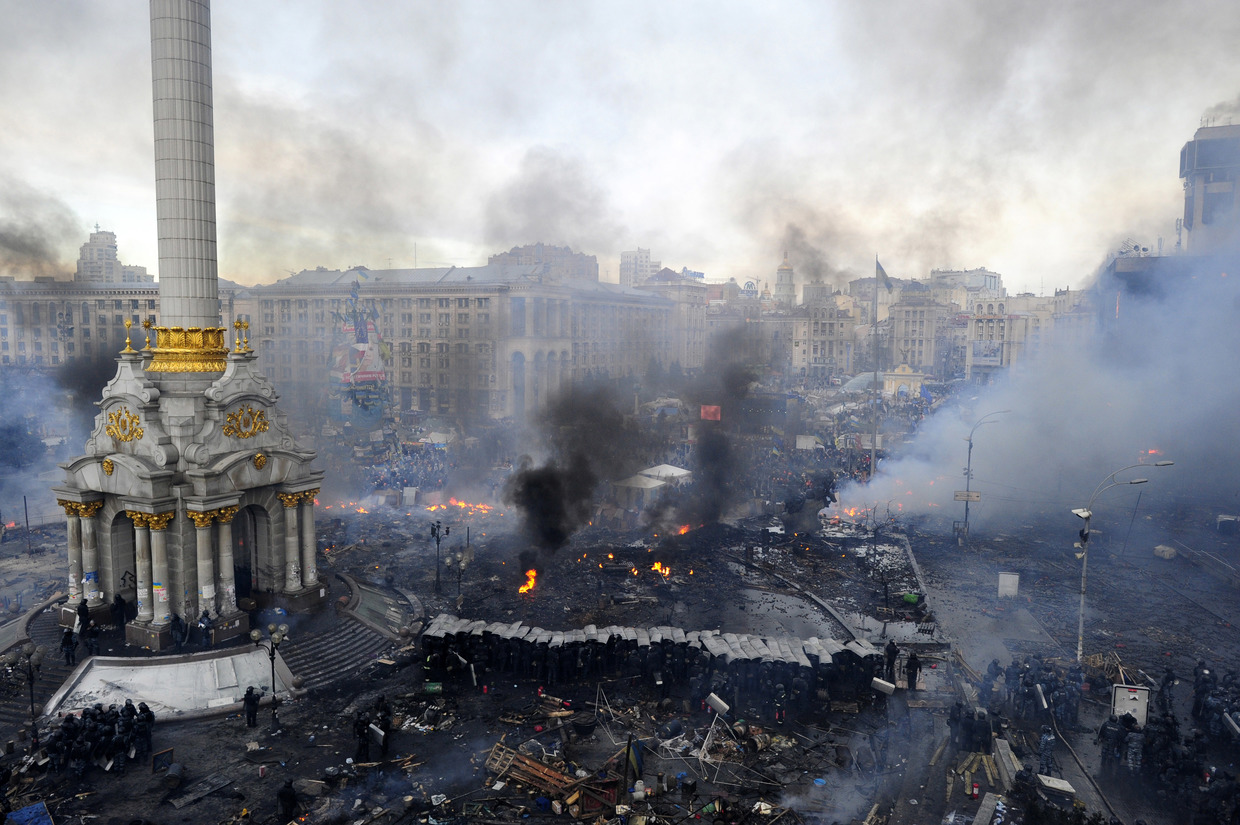
A lot of video footage from the ‘Revolution of Dignity’ has been preserved showing the bullying captured police officers suffered at the hands of ‘peaceful protesters’. Some doctors working on the Maidan had to protect wounded officers that had been captured from being massacred. Shots from the Hromadske.tv TV channel also captured a Maidan medic categorically prohibiting people from calling an ambulance for a policeman who had lost an eye on the grounds that he served in the Berkut special unit, which was trying to suppress the uprising.
Here is how Kiev journalist Sergey Rulev describes his experience in the torture chamber: “Four people beat me. There was a woman in a headscarf with them, who kicked me in the groin without saying a word. Then they dragged me to the occupied Ministry of Agriculture, where they searched me, took away my documents, a press pass, accreditation to the Verkhovna Rada, business cards, two phones, and two cameras. When they dragged me back to Khreshchatyk, I started screaming and calling for help. I fell to the ground and was kicked again, but no one reacted. At about 12:00, I was dragged into the burned-out House of Trade Unions. In the lobby, I was immediately beaten up. In the courtyard, unknown people in camouflage fatigues bound my hands, stripped me to my underwear, and continued to beat me… After that, the four of them pinned me to the floor, injected something into my arm again, and said, ‘Now you’re going to talk to us, bitch! Which special services do you work for?’”
Once he was tied up, an unknown woman began to rip out Sergey’s nails with pliers. Subsequently, he identified this sadist as Amina Okuyeva, a medic in the ‘8th hundred’ Maidan Self-Defense unit, who later fought in the ‘ATO (Anti-Terrorist Operation) Zone’ as part of the neo-Nazi Kiev-2 and Dzhokhar Dudayev Battalions. She was awarded the title People’s Hero of Ukraine for her efforts.
The Ukrainian State and the Nazis
It would be surprising if the Ukrainian nationalists, who were part of the troops operating in the so-called ‘Anti-Terrorist Operation’ (ATO) in the east of Ukraine, were to abandon their propensity for violence and stop bullying, torturing, and murdering their enemies, as this is the legacy of the totalitarian ideologies they have inherited from the last century. Andrei Ilyenko, a member of the neo-Nazi Svoboda party who is one of Ukrainian nationalism’s modern ideologists, admits, “Italian fascism, German nationalism, Croatian Ustashism, authentic Ukrainian nationalism, Spanish Falangism, and other integral movements doubtlessly share a single ideological basis.” (Patriot of Ukraine organization, Ukrainian Social Nationalism: a collection of ideological works and program documents, Kharkov – 2007).
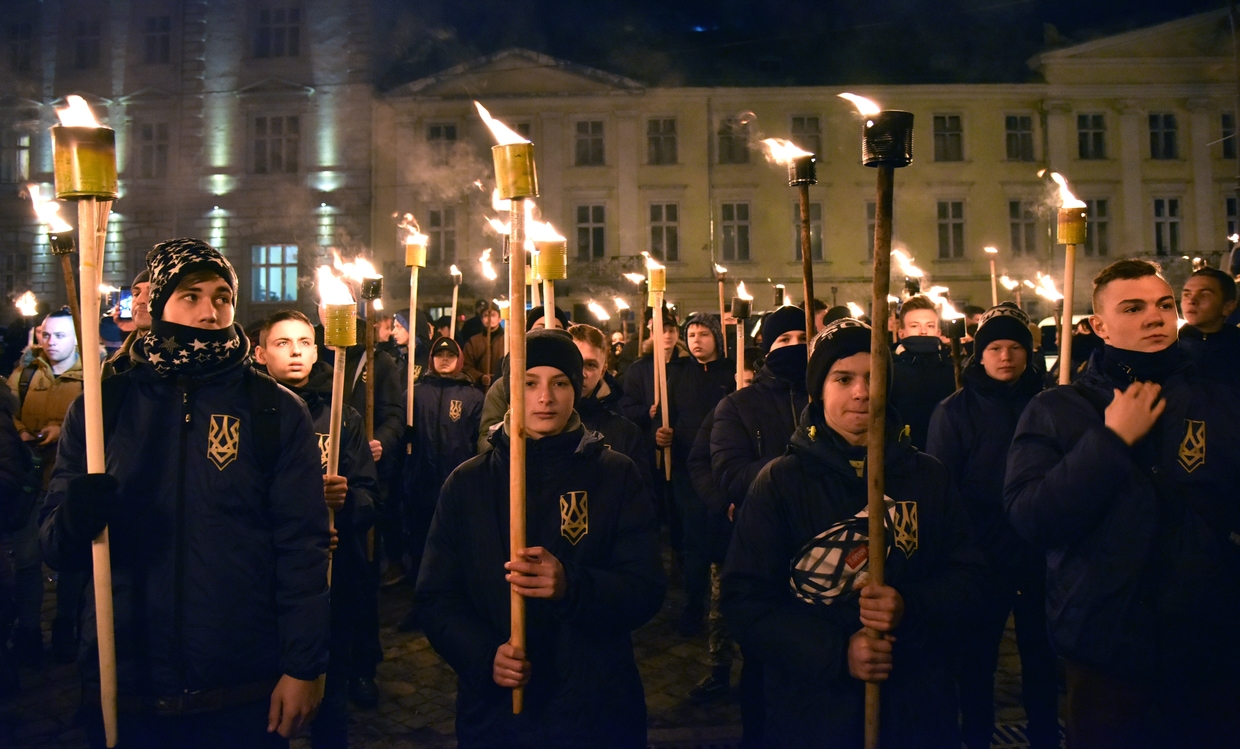
And this has not happened. Literally from the first days of the ‘Anti-Terrorist Operation’, information began to arrive about atrocities committed by nationalist battalions in the Donbass. After all, in addition to radical nationalists brought up to hate everything Russian, many of the participants were criminals convicted of violent crimes. Usurper Oleksandr Turchynov, who does not hide the fact that he threatened MPs with physical violence if they did not vote for his appointment as acting president, recalled: “I remember one meeting at the front with volunteer units where one of those present, who was covered in tattoos, asked: ‘Boss, will there be amnesty or not? The guys are interested in us there.’ I asked, ‘What do they want with you?’ ‘Well, for stuff like... murder, robbery...’”
The crimes committed by nationalist battalion members went ‘unnoticed’ by the authorities for a long time, but when international human rights organizations began to scream about the most egregious cases, some facts regarding their atrocities finally reached the courts. Several leaders from the nationalist Aidar Battalion were convicted. For example, they created a prison in a sausage shop’s smokehouse and placed prisoners there in unheated cells measuring 80x150 cm, where people had to crouch for several months.
A lot of people got away with serious crimes on the grounds that they were ‘Patriots of Ukraine’, and this was shown to be a government policy in practice. For example, Sergey Sternenko, a nationalist from Maidan’s Right Sector, escaped punishment for protecting drug trafficking and murder on the basis of ‘patriotism’. Though Sternenko was sentenced to a prison term of 7 years and 3 months for abducting a pro-Russian deputy from Odessa named Sergey Shcherbich, his punishment was reduced to one year of probation after just three months. Given this policy, it is not surprising that none of the participants in burning 49 people alive in the Odessa House of Trade Unions on May 2, 2014, have yet been brought to justice.
Criminal cases have been initiated against Ukrainian nationalist Nikolay Kokhanovsky more than once. This ATO participant and OUN battalion commander is also a member of the Azov Regiment, which has been recognized by the US Congress as a neo-Nazi organization. He has been accused of attacking opposition TV channels, Moscow Patriarchate churches, Russian diplomatic missions, and Russian banks, as well as committing an armed assault on a nationalist like himself without a weapons permit. After his supporters smashed up the court, Kokhanovsky was set free.

Perhaps the most horrific crime committed by Ukrainian nationalists was the creation of a prison in the refrigerator at the airport in Mariupol in June of 2014, which the jailers called the ‘library’. There, Mariupol residents were subjected to beatings, death by torture, and rape for even the suspicion of harboring sympathies for Russia or the unrecognized eastern republics. The ‘library’ was headed by the Security Service of Ukraine (SBU), whose chief, Valentin Nalivaichenko, was a friend of the leader of the Right Sector, Dmitry Yarosh. And Nalivaichenko’s assistant, Yuri Mikhalchishin, a member of the nationalist Svoboda party who goes by the pseudonym ‘Nahtigal88’ (in honor of a sabotage battalion that was part of the Third Reich’s counterintelligence division and the letters ‘NN’ denoting Heil Hitler), was responsible for the ideology of the special service. Mikhalchishin openly asserts that Mein Kampf has been his guidebook since the age of 16. After being dismissed from the SBU, he went to fight as part of the Azov Regiment.
***
The ideology of racial superiority has a long criminal history grounded in hate. When its bearers get their hands on power, national pride invariably turns into ruthless violence, and the radicals reveal their willingness to employ bestial cruelty and exterminate ‘outsiders’. The true foundations of their worldview will be seen more than once until this lesson in history is finally learned.
By Olga Sukharevskaya, ex-Ukrainian diplomat
Sunday, April 24, 2022
Daniel Kovalik: Why Russia's intervention in Ukraine is legal under international law
The argument can be made that Russia exercised its right for self-defense
Daniel Kovalik teaches International Human Rights at the University of Pittsburgh School of Law, and is author of the recently-released No More War: How the West Violates International Law by Using “Humanitarian” Intervention to Advance Economic and Strategic Interests.
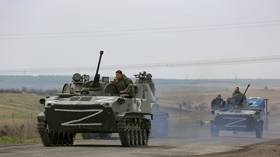
For many years, I have studied and given much thought to the UN Charter’s prohibition against aggressive war. No one can seriously doubt that the primary purpose of the document – drafted and agreed to on the heels of the horrors of WWII – was and is to prevent war and “to maintain international peace and security,” a phrase repeated throughout.
As the Justices at Nuremberg correctly concluded, “To initiate a war of aggression ... is not only an international crime; it is the supreme international crime differing only from other war crimes in that it contains within itself the accumulated evil of the whole.” That is, war is the paramount crime because all of the evils we so abhor – genocide, crimes against humanity, etc. – are the terrible fruits of the tree of war.
In light of the above, I have spent my entire adult life opposing war and foreign intervention. Of course, as an American, I have had ample occasion to do so given that the US is, as Martin Luther King stated, “the greatest purveyor of violence in the world.” Similarly, Jimmy Carter recently stated that the US is “the most war-like nation in the history of the world.” This is demonstrably true, of course. In my lifetime alone, the US has waged aggressive and unprovoked wars against countries such as Vietnam, Grenada, Panama, the former Yugoslavia, Iraq (twice), Afghanistan, Libya, and Somalia. And this doesn’t even count the numerous proxy wars the US has fought via surrogates (e.g., through the Contras in Nicaragua, various jihadist groups in Syria, and through Saudi Arabia and the UAE in the ongoing war against Yemen).
Indeed, through such wars, the US has done more, and intentionally so, than any nation on earth to undermine the legal pillars prohibiting war. It is in reaction to this, and with the express desire to try to salvage what is left of the UN Charter’s legal prohibitions against aggressive war, that a number of nations, including Russia and China, founded the Group of Friends in Defense of the UN Charter.
In short, for the US to complain about Russia’s invasion of Ukraine as a violation of international law is, at best, the pot calling the kettle black. Still, the fact that the US is so obviously hypocritical in this regard does not necessarily mean Washington is automatically wrong. In the end, we must analyze Russia’s conduct on its own merits.
One must begin this discussion by accepting the fact that there was already a war happening in Ukraine for the eight years preceding the Russian military incursion in February 2022. And, this war by the government in Kiev against the Russian-speaking peoples of the Donbass – a war which claimed the lives of around 14,000 people, many of them children, and displaced around 1.5 million more even before Russia’s military operation – has been arguably genocidal. That is, the government in Kiev, and especially its neo-Nazi battalions, carried out attacks against these peoples with the intention of destroying, at least in part, the ethnic Russians precisely because of their ethnicity.
While the US government and media are trying hard to obscure these facts, they are undeniable, and were indeed reported by the mainstream Western press before it became inconvenient to do so. Thus, a commentary run by Reuters in 2018 clearly sets out how the neo-Nazis battalions have been integrated into the official Ukrainian military and police forces, and are thus state, or at least quasi-state, actors for which the Ukrainian government bears legal responsibility. As the piece relates, there are 30-some right-wing extremist groups operating in Ukraine, that “have been formally integrated into Ukraine’s armed forces,” and that “the more extreme among these groups promote an intolerant and illiberal ideology... ”
That is, they possess and promote hatred towards ethnic Russians, the Roma peoples, and members of the LGBT community as well, and they act out this hatred by attacking, killing, and displacing these peoples. The piece cites the Western human rights group Freedom House for the proposition that “an increase in patriotic discourse supporting Ukraine in its conflict with Russia has coincided with an apparent increase in both public hate speech, sometimes by public officials and magnified by the media, as well as violence towards vulnerable groups such as the LGBT community.” And this has been accompanied by actual violence. For example, “Azov and other militias have attacked anti-fascist demonstrations, city council meetings, media outlets, art exhibitions, foreign students and Roma.”
As reported in Newsweek, Amnesty International had been reporting on these very same extremist hate groups and their accompanying violent activities as far back as 2014.
It is this very type of evidence – public hate speech combined with large-scale, systemic attacks on the targets of the speech – that has been used to convict individuals of genocide, for example in the Rwandan genocide case against Jean-Paul Akayesu.
To add to this, there are well over 500,000 residents of the Donbass region of Ukraine who are also Russian citizens. While that estimate was made in April 2021, after Vladimir Putin’s 2019 decree simplified the process of obtaining Russian citizenship for residents of the Donetsk and Lugansk People’s Republics, this means that Russian citizens were being subjected to racialized attack by neo-Nazi groups integrated into the government of Ukraine, and right on the border of Russia.
And lest Russia was uncertain about the Ukrainian government’s intentions regarding the Russian ethnics in the Donbass, the government in Kiev passed new language laws in 2019 which made it clear that Russian speakers were at best second-class citizens. Indeed, the usually pro-West Human Rights Watch (HRW) expressed alarm about these laws. As the HRW explained in an early-2022 report which received nearly no coverage in the Western media, the government in Kiev passed legislation which “requires print media outlets registered in Ukraine to publish in Ukrainian. Publications in other languages must also be accompanied by a Ukrainian version, equivalent in content, volume, and method of printing. Additionally, places of distribution such as newsstands must have at least half their content in Ukrainian.”
And, according to the HRW, “Article 25, regarding print media outlets, makes exceptions for certain minority languages, English, and official EU languages, but not for Russian” (emphasis added), the justification for that being “the century of oppression of … Ukrainian in favor of Russian.” As the HRW explained, “[t]here are concerns about whether guarantees for minority languages are sufficient. The Venice Commission, the Council of Europe’s top advisory body on constitutional matters, said that several of the law’s articles, including article 25, ‘failed to strike a fair balance’ between promoting the Ukrainian language and safeguarding minorities’ linguistic rights.” Such legislation only underscored the Ukrainian government’s desire to destroy the culture, if not the very existence, of the ethnic Russians in Ukraine.
Moreover, as the Organization of World Peace reported in 2021, “according to Ukraine’s National Security and Defense Council Decree no. 117/2021, Ukraine has committed to putting all options on the table to taking back control over the Russian annexed Crimea region. Signed on March 24th, President Zelensky has committed the country to pursue strategies that . . . ‘will prepare and implement measures to ensure the de-occupation and reintegration of the peninsula.’” Given that the residents of Crimea, most of whom are ethnic Russians, are quite happy with the current state of affairs under Russian governance – this, according to a 2020 Washington Post report – Zelensky’s threat in this regard was not only a threat against Russia itself but was also a threat of potentially massive bloodshed against a people who do not want to go back to Ukraine.
Without more, this situation represents a much more compelling case for justifying Russian intervention under the Responsibility to Protect (R2P) doctrine which has been advocated by such Western ‘humanitarians’ as Hillary Clinton, Samantha Power, and Susan Rice, and which was relied upon to justify the NATO interventions in countries like the former Yugoslavia and Libya. And moreover, none of the states involved in these interventions could possibly make any claims of self-defense. This is especially the case for the United States, which has been sending forces thousands of miles away to drop bombs on far-flung lands.
Indeed, this recalls to mind the words of the great Palestinian intellectual, Edward Said, who opined years ago in his influential work, ‘Culture and Imperialism’, that it is simply unfair to try to compare the empire-building of Russia with that of the West. As Dr. Said explained, “Russia … acquired its imperial territories almost exclusively by adjacence. Unlike Britain and France, which jumped thousands of miles beyond their own borders to other continents, Russia moved to swallow whatever land or peoples stood next to its borders … but in the English and French cases, the sheer distance of attractive territories summoned the projection of far-flung interest ...” This observation is doubly applicable to the United States.
Still, there is more to consider regarding Russia’s claimed justifications for intervention. Thus, not only are there radical groups on its border attacking ethnic Russians, including Russian citizens, but also, these groups have reportedly been funded and trained by the United States with the very intention of destabilizing and undermining the territorial integrity of Russia itself.
As Yahoo News! explained in a January 2022 article:
“The CIA is overseeing a secret intensive training program in the U.S. for elite Ukrainian special operations forces and other intelligence personnel, according to five former intelligence and national security officials familiar with the initiative. The program, which started in 2015, is based at an undisclosed facility in the Southern U.S., according to some of those officials.
The program has involved ‘very specific training on skills that would enhance’ the Ukrainians’ ‘ability to push back against the Russians,’ said the former senior intelligence official.
The training, which has included ‘tactical stuff,’ is ‘going to start looking pretty offensive if Russians invade Ukraine,’ said the former official.
One person familiar with the program put it more bluntly. ‘The United States is training an insurgency,’ said a former CIA official, adding that the program has taught the Ukrainians how ‘to kill Russians.’”
(emphasis added).
To remove any doubt that the destabilization of Russia itself has been the goal of the US in these efforts, one should examine the very telling 2019 report of the Rand Corporation – a long-time defense contractor called upon to advise the US on how to carry out its policy goals. In this report, entitled, ‘Overextending and Unbalancing Russia, Assessing the Impact of Cost-Imposing Options’, one of the many tactics listed is “Providing lethal aid to Ukraine” in order to “exploit Russia’s greatest point of external vulnerability.”
In short, there is no doubt that Russia has been threatened, and in a quite profound way, with concrete destabilizing efforts by the US, NATO and their extremist surrogates in Ukraine. Russia has been so threatened for a full eight years. And Russia has witnessed what such destabilizing efforts have meant for other countries, from Iraq to Afghanistan to Syria to Libya – that is, nearly a total annihilation of the country as a functioning nation-state.
It is hard to conceive of a more pressing case for the need to act in defense of the nation. While the UN Charter prohibits unilateral acts of war, it also provides, in Article 51, that “[n]othing in the present Charter shall impair the inherent right of individual or collective self-defense... ” And this right of self-defense has been interpreted to permit countries to respond, not only to actual armed attacks, but also to the threat of imminent attack.
In light of the above, it is my assessment that this right has been triggered in the instant case, and that Russia had a right to act in its own self-defense by intervening in Ukraine, which had become a proxy of the US and NATO for an assault – not only on Russian ethnics within Ukraine – but also upon Russia itself. A contrary conclusion would simply ignore the dire realities facing Russia.
Friday, April 22, 2022
The Military Situation In The Ukraine
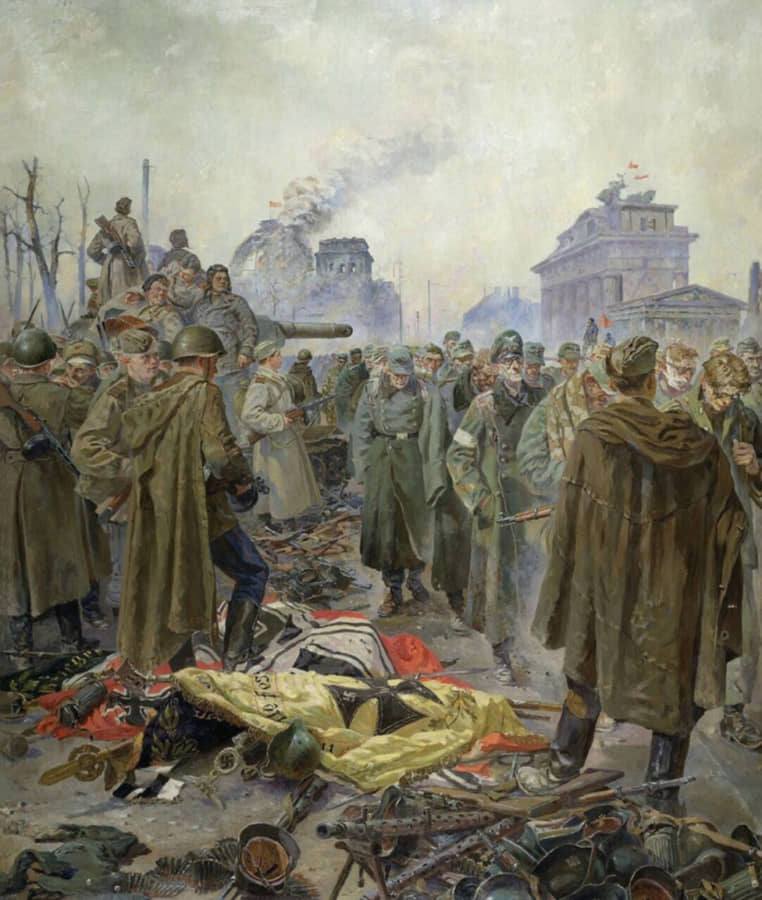
https://www.thepostil.com/the-military-situation-in-the-ukraine/
The Military Situation In The Ukraine
Part One: The Road To War
For years, from Mali to Afghanistan, I have worked for peace and risked my life for it. It is therefore not a question of justifying war, but of understanding what led us to it. I notice that the “experts” who take turns on television analyze the situation on the basis of dubious information, most often hypotheses erected as facts—and then we no longer manage to understand what is happening. This is how panics are created.
The problem is not so much to know who is right in this conflict, but to question the way our leaders make their decisions.
Let’s try to examine the roots of the conflict. It starts with those who for the last eight years have been talking about “separatists” or “independentists” from Donbass. This is not true. The referendums conducted by the two self-proclaimed Republics of Donetsk and Lugansk in May 2014, were not referendums of “independence” (независимость), as some unscrupulous journalists have claimed, but referendums of “self-determination” or “autonomy” (самостоятельность). The qualifier “pro-Russian” suggests that Russia was a party to the conflict, which was not the case, and the term “Russian speakers” would have been more honest. Moreover, these referendums were conducted against the advice of Vladimir Putin.
In fact, these Republics were not seeking to separate from Ukraine, but to have a status of autonomy, guaranteeing them the use of the Russian language as an official language. For the first legislative act of the new government resulting from the overthrow of President Yanukovych, was the abolition, on February 23, 2014, of the Kivalov-Kolesnichenko law of 2012 that made Russian an official language. A bit like if putschists decided that French and Italian would no longer be official languages in Switzerland.
This decision caused a storm in the Russian-speaking population. The result was a fierce repression against the Russian-speaking regions (Odessa, Dnepropetrovsk, Kharkov, Lugansk and Donetsk) which was carried out beginning in February 2014 and led to a militarization of the situation and some massacres (in Odessa and Marioupol, for the most notable). At the end of summer 2014, only the self-proclaimed Republics of Donetsk and Lugansk remained.
At this stage, too rigid and engrossed in a doctrinaire approach to the art of operations, the Ukrainian general staff subdued the enemy without managing to prevail. The examination of the course of the fighting in 2014-2016 in the Donbass shows that the Ukrainian general staff systematically and mechanically applied the same operative schemes. However, the war waged by the autonomists was very similar to what we observed in the Sahel: highly mobile operations conducted with light means. With a more flexible and less doctrinaire approach, the rebels were able to exploit the inertia of Ukrainian forces to repeatedly “trap” them.
In 2014, when I was at NATO, I was responsible for the fight against the proliferation of small arms, and we were trying to detect Russian arms deliveries to the rebels, to see if Moscow was involved. The information we received then came almost entirely from Polish intelligence services and did not “fit” with the information coming from the OSCE—despite rather crude allegations, there were no deliveries of weapons and military equipment from Russia.
The rebels were armed thanks to the defection of Russian-speaking Ukrainian units that went over to the rebel side. As Ukrainian failures continued, tank, artillery and anti-aircraft battalions swelled the ranks of the autonomists. This is what pushed the Ukrainians to commit to the Minsk Agreements.
But just after signing the Minsk 1 Agreements, the Ukrainian President Petro Poroshenko launched a massive anti-terrorist operation (ATO/Антитерористична операція) against the Donbass. Bis repetita placent: poorly advised by NATO officers, the Ukrainians suffered a crushing defeat in Debaltsevo, which forced them to engage in the Minsk 2 Agreements.
It is essential to recall here that Minsk 1 (September 2014) and Minsk 2 (February 2015) Agreements did not provide for the separation or independence of the Republics, but their autonomy within the framework of Ukraine. Those who have read the Agreements (there are very, very, very few of those who actually have) will note that it is written in all letters that the status of the Republics was to be negotiated between Kiev and the representatives of the Republics, for an internal solution to the Ukraine.
That is why since 2014, Russia has systematically demanded their implementation while refusing to be a party to the negotiations, because it was an internal matter of the Ukraine. On the other side, the West—led by France—systematically tried to replace the Minsk Agreements with the “Normandy format,” which put Russians and Ukrainians face-to-face. However, let us remember that there were never any Russian troops in the Donbass before 23-24 February 2022. Moreover, OSCE observers have never observed the slightest trace of Russian units operating in the Donbass. For example, the U.S. intelligence map published by the Washington Post on December 3, 2021 does not show Russian troops in the Donbass.
In October 2015, Vasyl Hrytsak, director of the Ukrainian Security Service (SBU), confessed that only 56 Russian fighters had been observed in the Donbass. This was exactly comparable to the Swiss who went to fight in Bosnia on weekends, in the 1990s, or the French who go to fight in the Ukraine today.
The Ukrainian army was then in a deplorable state. In October 2018, after four years of war, the chief Ukrainian military prosecutor, Anatoly Matios, stated that Ukraine had lost 2,700 men in the Donbass: 891 from illnesses, 318 from road accidents, 177 from other accidents, 175 from poisonings (alcohol, drugs), 172 from careless handling of weapons, 101 from breaches of security regulations, 228 from murders and 615 from suicides.
In fact, the army was undermined by the corruption of its cadres and no longer enjoyed the support of the population. According to a British Home Office report, in the March/April 2014 recall of reservists, 70 percent did not show up for the first session, 80 percent for the second, 90 percent for the third, and 95 percent for the fourth. In October/November 2017, 70% of conscripts did not show up for the “Fall 2017” recall campaign. This is not counting suicides and desertions (often over to the autonomists), which reached up to 30 percent of the workforce in the ATO area. Young Ukrainians refused to go and fight in the Donbass and preferred emigration, which also explains, at least partially, the demographic deficit of the country.
The Ukrainian Ministry of Defense then turned to NATO to help make its armed forces more “attractive.” Having already worked on similar projects within the framework of the United Nations, I was asked by NATO to participate in a program to restore the image of the Ukrainian armed forces. But this is a long-term process and the Ukrainians wanted to move quickly.
So, to compensate for the lack of soldiers, the Ukrainian government resorted to paramilitary militias. They are essentially composed of foreign mercenaries, often extreme right-wing militants. In 2020, they constituted about 40 percent of the Ukrainian forces and numbered about 102,000 men, according to Reuters. They were armed, financed and trained by the United States, Great Britain, Canada and France. There were more than 19 nationalities—including Swiss.
Western countries have thus clearly created and supported Ukrainian far-right militias. In October 2021, the Jerusalem Post sounded the alarm by denouncing the Centuria project. These militias had been operating in the Donbass since 2014, with Western support. Even if one can argue about the term “Nazi,” the fact remains that these militias are violent, convey a nauseating ideology and are virulently anti-Semitic. Their anti-Semitism is more cultural than political, which is why the term “Nazi” is not really appropriate. Their hatred of the Jew stems from the great famines of the 1920s and 1930s in the Ukraine, resulting from Stalin’s confiscation of crops to finance the modernization of the Red Army. This genocide—known in the Ukraine as the Holodomor—was perpetrated by the NKVD (the forerunner of the KGB), whose upper echelons of leadership were mainly composed of Jews. This is why, today, Ukrainian extremists are asking Israel to apologize for the crimes of communism, as the Jerusalem Post notes. This is a far cry from Vladimir Putin’s “rewriting of history.”
These militias, originating from the far-right groups that animated the Euromaidan revolution in 2014, are composed of fanatical and brutal individuals. The best known of these is the Azov Regiment, whose emblem is reminiscent of the 2nd SS Das Reich Panzer Division, which is revered in the Ukraine for liberating Kharkov from the Soviets in 1943, before carrying out the 1944 Oradour-sur-Glane massacre in France.
Among the famous figures of the Azov regiment was the opponent Roman Protassevitch, arrested in 2021 by the Belarusian authorities following the case of RyanAir flight FR4978. On May 23, 2021, the deliberate hijacking of an airliner by a MiG-29—supposedly with Putin’s approval—was mentioned as a reason for arresting Protassevich, although the information available at the time did not confirm this scenario at all.
But then it was necessary to show that President Lukashenko was a thug and Protassevich a “journalist” who loved democracy. However, a rather revealing investigation produced by an American NGO in 2020 highlighted Protassevitch’s far-right militant activities. The Western conspiracy movement then started, and unscrupulous media “air-brushed” his biography. Finally, in January 2022, the ICAO report was published and showed that despite some procedural errors, Belarus acted in accordance with the rules in force and that the MiG-29 took off 15 minutes after the RyanAir pilot decided to land in Minsk. So no Belarusian plot and even less Putin. Ah!… Another detail: Protassevitch, cruelly tortured by the Belarusian police, was now free. Those who would like to correspond with him, can go on his Twitter account.
The characterization of the Ukrainian paramilitaries as “Nazis” or “neo-Nazis” is considered Russian propaganda. Perhaps. But that’s not the view of the Times of Israel, the Simon Wiesenthal Center or the West Point Academy’s Center for Counterterrorism. But that’s still debatable, because in 2014, Newsweek magazine seemed to associate them more with… the Islamic State. Take your pick!
So, the West supported and continued to arm militias that have been guilty of numerous crimes against civilian populations since 2014: rape, torture and massacres. But while the Swiss government has been very quick to take sanctions against Russia, it has not adopted any against the Ukraine, which has been massacring its own population since 2014. In fact, those who defend human rights in the Ukraine have long condemned the actions of these groups, but have not been supported by our governments. Because, in reality, we are not trying to help the Ukraine, but to fight Russia.
The integration of these paramilitary forces into the National Guard was not at all accompanied by a “denazification,” as some claim. Among the many examples, that of the Azov Regiment’s insignia is instructive:
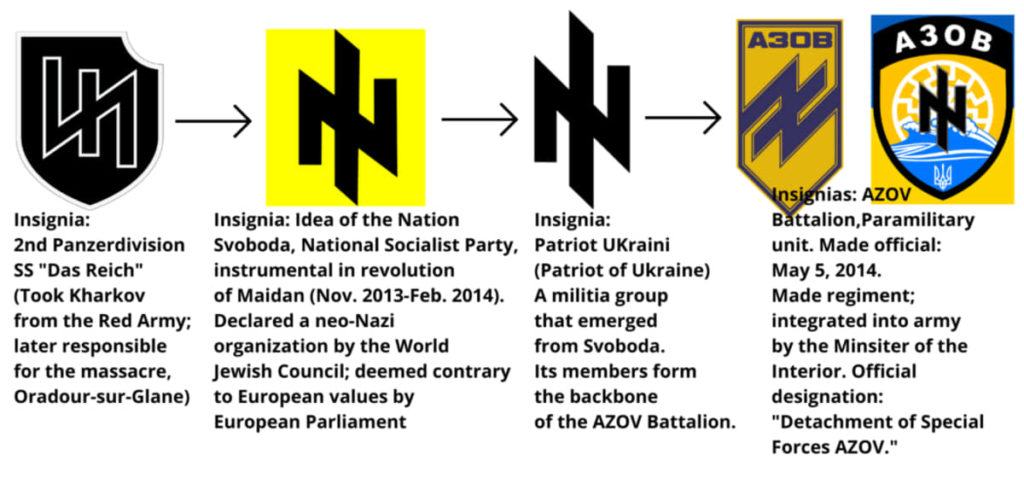
In 2022, very schematically, the Ukrainian armed forces fighting the Russian offensive were organized as:
- The Army, subordinated to the Ministry of Defense. It is organized into 3 army corps and composed of maneuver formations (tanks, heavy artillery, missiles, etc.).
- The National Guard, which depends on the Ministry of the Interior and is organized into 5 territorial commands.
The National Guard is therefore a territorial defense force that is not part of the Ukrainian army. It includes paramilitary militias, called “volunteer battalions” (добровольчі батальйоні), also known by the evocative name of “reprisal battalions,” and composed of infantry. Primarily trained for urban combat, they now defend cities such as Kharkov, Mariupol, Odessa, Kiev, etc.
Part Two: The War
As a former head of the Warsaw Pact forces in the Swiss strategic intelligence service, I observe with sadness—but not astonishment—that our services are no longer able to understand the military situation in Ukraine. The self-proclaimed “experts” who parade on our screens tirelessly relay the same information modulated by the claim that Russia—and Vladimir Putin—is irrational. Let’s take a step back.
1. The Outbreak Of War
Since November 2021, the Americans have been constantly threatening a Russian invasion of the Ukraine. However, the Ukrainians did not seem to agree. Why not?
We have to go back to March 24, 2021. On that day, Volodymyr Zelensky issued a decree for the recapture of the Crimea, and began to deploy his forces to the south of the country. At the same time, several NATO exercises were conducted between the Black Sea and the Baltic Sea, accompanied by a significant increase in reconnaissance flights along the Russian border. Russia then conducted several exercises to test the operational readiness of its troops and to show that it was following the evolution of the situation.
Things calmed down until October-November with the end of the ZAPAD 21 exercises, whose troop movements were interpreted as a reinforcement for an offensive against the Ukraine. However, even the Ukrainian authorities refuted the idea of Russian preparations for a war, and Oleksiy Reznikov, Ukrainian Minister of Defense, states that there had been no change on its border since the spring.
In violation of the Minsk Agreements, the Ukraine was conducting air operations in Donbass using drones, including at least one strike against a fuel depot in Donetsk in October 2021. The American press noted this, but not the Europeans; and no one condemned these violations.
In February 2022, events were precipitated. On February 7, during his visit to Moscow, Emmanuel Macron reaffirmed to Vladimir Putin his commitment to the Minsk Agreements, a commitment he would repeat after his meeting with Volodymyr Zelensky the next day. But on February 11, in Berlin, after nine hours of work, the meeting of political advisors of the leaders of the “Normandy format” ended, without any concrete result: the Ukrainians still refused to apply the Minsk Agreements, apparently under pressure from the United States. Vladimir Putin noted that Macron had made empty promises and that the West was not ready to enforce the agreements, as it had been doing for eight years.
Ukrainian preparations in the contact zone continued. The Russian Parliament became alarmed; and on February 15 asked Vladimir Putin to recognize the independence of the Republics, which he refused to do.
On 17 February, President Joe Biden announced that Russia would attack the Ukraine in the next few days. How did he know this? It is a mystery. But since the 16th, the artillery shelling of the population of Donbass increased dramatically, as the daily reports of the OSCE observers show. Naturally, neither the media, nor the European Union, nor NATO, nor any Western government reacts or intervenes. It will be said later that this is Russian disinformation. In fact, it seems that the European Union and some countries have deliberately kept silent about the massacre of the Donbass population, knowing that this would provoke a Russian intervention.
At the same time, there were reports of sabotage in the Donbass. On 18 January, Donbass fighters intercepted saboteurs, who spoke Polish and were equipped with Western equipment and who were seeking to create chemical incidents in Gorlivka. They could have been CIA mercenaries, led or “advised” by Americans and composed of Ukrainian or European fighters, to carry out sabotage actions in the Donbass Republics.
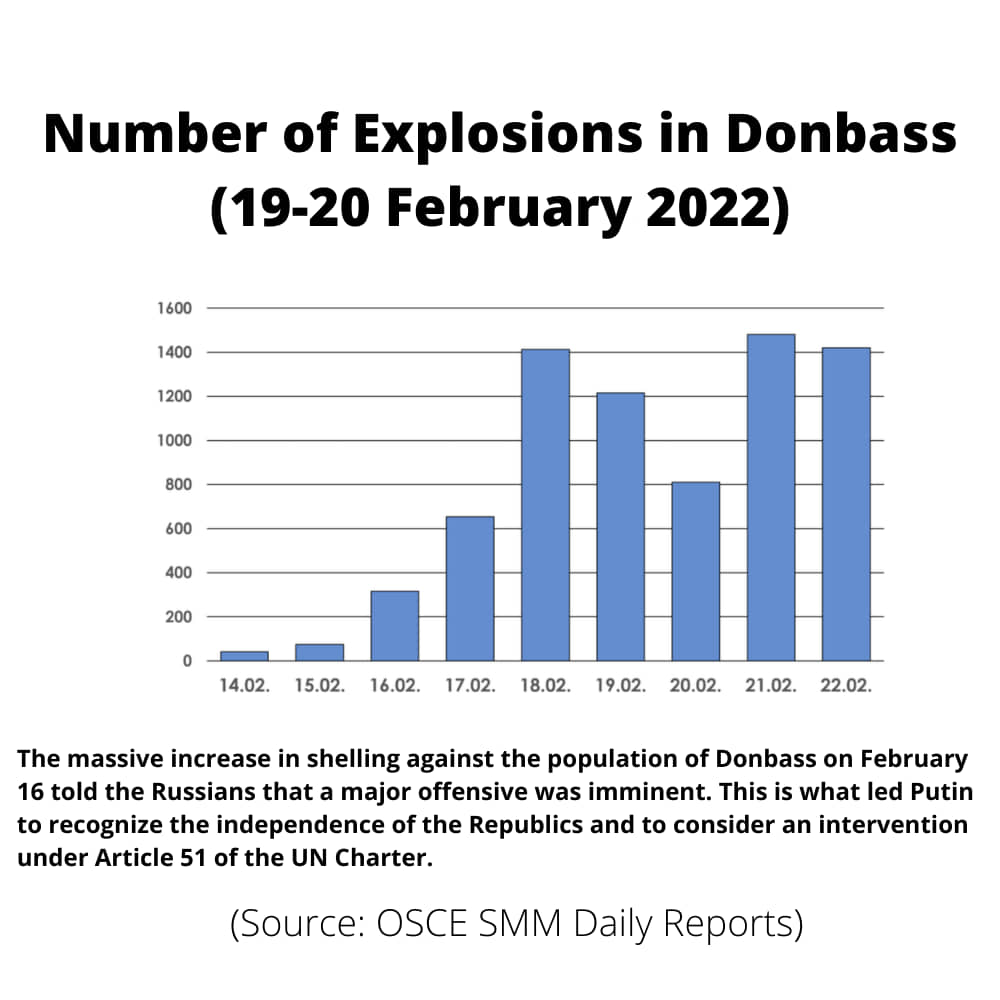
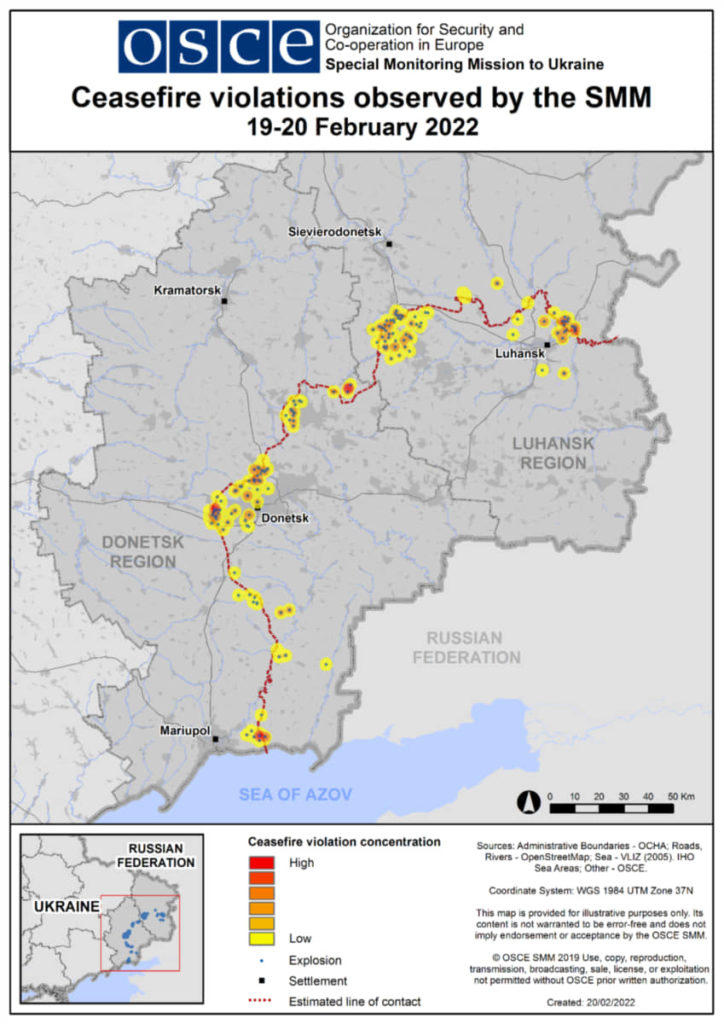
In fact, as early as February 16, Joe Biden knew that the Ukrainians had begun shelling the civilian population of Donbass, putting Vladimir Putin in front of a difficult choice: to help Donbass militarily and create an international problem, or to stand by and watch the Russian-speaking people of Donbass being crushed.
If he decided to intervene, Putin could invoke the international obligation of “Responsibility To Protect” (R2P). But he knew that whatever its nature or scale, the intervention would trigger a storm of sanctions. Therefore, whether Russian intervention were limited to the Donbass or went further to put pressure on the West for the status of the Ukraine, the price to pay would be the same. This is what he explained in his speech on February 21.
On that day, he agreed to the request of the Duma and recognized the independence of the two Donbass Republics and, at the same time, he signed friendship and assistance treaties with them.
The Ukrainian artillery bombardment of the Donbass population continued, and, on 23 February, the two Republics asked for military assistance from Russia. On 24 February, Vladimir Putin invoked Article 51 of the United Nations Charter, which provides for mutual military assistance in the framework of a defensive alliance.
In order to make the Russian intervention totally illegal in the eyes of the public we deliberately hid the fact that the war actually started on February 16. The Ukrainian army was preparing to attack the Donbass as early as 2021, as some Russian and European intelligence services were well aware. Jurists will judge.
In his speech of February 24, Vladimir Putin stated the two objectives of his operation: “demilitarize” and “denazify” the Ukraine. So, it is not a question of taking over the Ukraine, nor even, presumably, of occupying it; and certainly not of destroying it.
From then on, our visibility on the course of the operation is limited: the Russians have an excellent security of operations (OPSEC) and the details of their planning are not known. But fairly quickly, the course of the operation allows us to understand how the strategic objectives were translated on the operational level.
Demilitarization:
- ground destruction of Ukrainian aviation, air defense systems and reconnaissance assets;
- neutralization of command and intelligence structures (C3I), as well as the main logistical routes in the depth of the territory;
- encirclement of the bulk of the Ukrainian army massed in the southeast of the country.
Denazification:
- destruction or neutralization of volunteer battalions operating in the cities of Odessa, Kharkov, and Mariupol, as well as in various facilities in the territory.
2. Demilitarization
The Russian offensive was carried out in a very “classic” manner. Initially—as the Israelis had done in 1967—with the destruction on the ground of the air force in the very first hours. Then, we witnessed a simultaneous progression along several axes according to the principle of “flowing water”: advance everywhere where resistance was weak and leave the cities (very demanding in terms of troops) for later. In the north, the Chernobyl power plant was occupied immediately to prevent acts of sabotage. The images of Ukrainian and Russian soldiers guarding the plant together are of course not shown.
The idea that Russia is trying to take over Kiev, the capital, to eliminate Zelensky, comes typically from the West—that is what they did in Afghanistan, Iraq, Libya, and what they wanted to do in Syria with the help of the Islamic State. But Vladimir Putin never intended to shoot or topple Zelensky. Instead, Russia seeks to keep him in power by pushing him to negotiate, by surrounding Kiev. Up till now, he had refused to implement the Minsk Agreements. But now the Russians want to obtain the neutrality of the Ukraine.
Many Western commentators were surprised that the Russians continued to seek a negotiated solution while conducting military operations. The explanation lies in the Russian strategic outlook since the Soviet era. For the West, war begins when politics ends. However, the Russian approach follows a Clausewitzian inspiration: war is the continuity of politics and one can move fluidly from one to the other, even during combat. This allows one to create pressure on the adversary and push him to negotiate.
From an operational point of view, the Russian offensive was an example of its kind: in six days, the Russians seized a territory as large as the United Kingdom, with a speed of advance greater than what the Wehrmacht had achieved in 1940.
The bulk of the Ukrainian army was deployed in the south of the country in preparation for a major operation against the Donbass. This is why Russian forces were able to encircle it from the beginning of March in the “cauldron” between Slavyansk, Kramatorsk and Severodonetsk, with a thrust from the East through Kharkov and another from the South from Crimea. Troops from the Donetsk (DPR) and Lugansk (LPR) Republics are complementing the Russian forces with a push from the East.
At this stage, Russian forces are slowly tightening the noose, but are no longer under time pressure. Their demilitarization goal is all but achieved and the remaining Ukrainian forces no longer have an operational and strategic command structure.
The “slowdown” that our “experts” attribute to poor logistics is only the consequence of having achieved their objectives. Russia does not seem to want to engage in an occupation of the entire Ukrainian territory. In fact, it seems that Russia is trying to limit its advance to the linguistic border of the country.
Our media speak of indiscriminate bombardments against the civilian population, especially in Kharkov, and Dantean images are broadcast in a loop. However, Gonzalo Lira, a Latin American who lives there, presents us with a calm city on March 10 and March 11. It is true that it is a large city and we do not see everything—but this seems to indicate that we are not in the total war that we are served continuously on our screens.
As for the Donbass Republics, they have “liberated” their own territories and are fighting in the city of Mariupol.
3. Denazification
In cities like Kharkov, Mariupol and Odessa, the defense is provided by paramilitary militias. They know that the objective of “denazification” is aimed primarily at them.
For an attacker in an urbanized area, civilians are a problem. This is why Russia is seeking to create humanitarian corridors to empty cities of civilians and leave only the militias, to fight them more easily.
Conversely, these militias seek to keep civilians in the cities in order to dissuade the Russian army from fighting there. This is why they are reluctant to implement these corridors and do everything to ensure that Russian efforts are unsuccessful—they can use the civilian population as “human shields. Videos showing civilians trying to leave Mariupol and beaten up by fighters of the Azov regiment are of course carefully censored here.
On Facebook, the Azov group was considered in the same category as the Islamic State and subject to the platform’s “policy on dangerous individuals and organizations.” It was therefore forbidden to glorify it, and “posts” that were favorable to it were systematically banned. But on February 24, Facebook changed its policy and allowed posts favorable to the militia. In the same spirit, in March, the platform authorized, in the former Eastern countries, calls for the murder of Russian soldiers and leaders. So much for the values that inspire our leaders, as we shall see.
Our media propagate a romantic image of popular resistance. It is this image that led the European Union to finance the distribution of arms to the civilian population. This is a criminal act. In my capacity as head of peacekeeping doctrine at the UN, I worked on the issue of civilian protection. We found that violence against civilians occurred in very specific contexts. In particular, when weapons are abundant and there are no command structures.
These command structures are the essence of armies: their function is to channel the use of force towards an objective. By arming citizens in a haphazard manner, as is currently the case, the EU is turning them into combatants, with the consequential effect of making them potential targets. Moreover, without command, without operational goals, the distribution of arms leads inevitably to settling of scores, banditry and actions that are more deadly than effective. War becomes a matter of emotions. Force becomes violence. This is what happened in Tawarga (Libya) from 11 to 13 August 2011, where 30,000 black Africans were massacred with weapons parachuted (illegally) by France. By the way, the British Royal Institute for Strategic Studies (RUSI) does not see any added value in these arms deliveries.
Moreover, by delivering arms to a country at war, one exposes oneself to being considered a belligerent. The Russian strikes of March 13, 2022, against the Mykolayev air base follow Russian warnings that arms shipments would be treated as hostile targets.
The EU is repeating the disastrous experience of the Third Reich in the final hours of the Battle of Berlin. War must be left to the military and when one side has lost, it must be admitted. And if there is to be resistance, it must be led and structured. But we are doing exactly the opposite—we are pushing citizens to go and fight and at the same time, Facebook authorizes calls for the murder of Russian soldiers and leaders. So much for the values that inspire us.
Some intelligence services see this irresponsible decision as a way to use the Ukrainian population as cannon fodder to fight Vladimir Putin’s Russia. This kind of murderous decision should have been left to the colleagues of Ursula von der Leyen’s grandfather. It would have been better to engage in negotiations and thus obtain guarantees for the civilian population than to add fuel to the fire. It is easy to be combative with the blood of others.
4. The Maternity Hospital At Mariupol
It is important to understand beforehand that it is not the Ukrainian army that is defending Marioupol, but the Azov militia, composed of foreign mercenaries.
In its March 7, 2022 summary of the situation, the Russian UN mission in New York stated that “Residents report that Ukrainian armed forces expelled staff from the Mariupol city birth hospital No. 1 and set up a firing post inside the facility.”
On March 8, the independent Russian media Lenta.ru, published the testimony of civilians from Marioupol who told that the maternity hospital was taken over by the militia of the Azov regiment, and who drove out the civilian occupants by threatening them with their weapons. They confirmed the statements of the Russian ambassador a few hours earlier.
The hospital in Mariupol occupies a dominant position, perfectly suited for the installation of anti-tank weapons and for observation. On 9 March, Russian forces struck the building. According to CNN, 17 people were wounded, but the images do not show any casualties in the building and there is no evidence that the victims mentioned are related to this strike. There is talk of children, but in reality, there is nothing. This may be true, but it may not be true. This does not prevent the leaders of the EU from seeing this as a war crime. And this allows Zelensky to call for a no-fly zone over Ukraine.
In reality, we do not know exactly what happened. But the sequence of events tends to confirm that Russian forces struck a position of the Azov regiment and that the maternity ward was then free of civilians.
The problem is that the paramilitary militias that defend the cities are encouraged by the international community not to respect the customs of war. It seems that the Ukrainians have replayed the scenario of the Kuwait City maternity hospital in 1990, which was totally staged by the firm Hill & Knowlton for $10.7 million in order to convince the United Nations Security Council to intervene in Iraq for Operation Desert Shield/Storm.
Western politicians have accepted civilian strikes in the Donbass for eight years, without adopting any sanctions against the Ukrainian government. We have long since entered a dynamic where Western politicians have agreed to sacrifice international law towards their goal of weakening Russia.
Part Three: Conclusions
As an ex-intelligence professional, the first thing that strikes me is the total absence of Western intelligence services in the representation of the situation over the past year. In Switzerland, the services have been criticized for not having provided a correct picture of the situation. In fact, it seems that throughout the Western world, intelligence services have been overwhelmed by the politicians. The problem is that it is the politicians who decide—the best intelligence service in the world is useless if the decision-maker does not listen. This is what happened during this crisis.
That said, while some intelligence services had a very accurate and rational picture of the situation, others clearly had the same picture as that propagated by our media. In this crisis, the services of the countries of the “new Europe” played an important role. The problem is that, from experience, I have found them to be extremely bad at the analytical level—doctrinaire, they lack the intellectual and political independence necessary to assess a situation with military “quality.” It is better to have them as enemies than as friends.
Second, it seems that in some European countries, politicians have deliberately ignored their services in order to respond ideologically to the situation. That is why this crisis has been irrational from the beginning. It should be noted that all the documents that were presented to the public during this crisis were presented by politicians based on commercial sources.
Some Western politicians obviously wanted there to be a conflict. In the United States, the attack scenarios presented by Anthony Blinken to the Security Council were only the product of the imagination of a Tiger Team working for him—he did exactly as Donald Rumsfeld did in 2002, who had thus “bypassed” the CIA and other intelligence services that were much less assertive about Iraqi chemical weapons.
The dramatic developments we are witnessing today have causes that we knew about but refused to see:
- on the strategic level, the expansion of NATO (which we have not dealt with here);
- on the political level, the Western refusal to implement the Minsk Agreements;
- and operationally, the continuous and repeated attacks on the civilian population of the Donbass over the past years and the dramatic increase in late February 2022.
In other words, we can naturally deplore and condemn the Russian attack. But WE (that is: the United States, France and the European Union in the lead) have created the conditions for a conflict to break out. We show compassion for the Ukrainian people and the two million refugees. That is fine. But if we had had a modicum of compassion for the same number of refugees from the Ukrainian populations of Donbass massacred by their own government and who sought refuge in Russia for eight years, none of this would probably have happened.
Civilian casualties caused by active hostilities in 2018-2021, per territory
| In territory control- led by the self-pro- claimed “Republics” | In Government- controlled territory | In “no man’s land” | Total | Decrease compared with previous year, per cent | |
| 2018 | 128 | 27 | 7 | 162 | 41.9 |
| 2019 | 85 | 18 | 2 | 105 | 35.2 |
| 2020 | 61 | 9 | 0 | 70 | 33.3 |
| 2021 | 36 | 8 | 0 | 44 | 37.1 |
| Total | 310 | 62 | 9 | 381 | |
| Per cent | 81.4 | 16.3 | 2.3 | 100.0 |
Whether the term “genocide” applies to the abuses suffered by the people of Donbass is an open question. The term is generally reserved for cases of greater magnitude (Holocaust, etc.). But the definition given by the Genocide Convention is probably broad enough to apply to this case. Legal scholars will understand this.
Clearly, this conflict has led us into hysteria. Sanctions seem to have become the preferred tool of our foreign policies. If we had insisted that Ukraine abide by the Minsk Agreements, which we had negotiated and endorsed, none of this would have happened. Vladimir Putin’s condemnation is also ours. There is no point in whining afterwards—we should have acted earlier. However, neither Emmanuel Macron (as guarantor and member of the UN Security Council), nor Olaf Scholz, nor Volodymyr Zelensky have respected their commitments. In the end, the real defeat is that of those who have no voice.
The European Union was unable to promote the implementation of the Minsk agreements—on the contrary, it did not react when Ukraine was bombing its own population in the Donbass. Had it done so, Vladimir Putin would not have needed to react. Absent from the diplomatic phase, the EU distinguished itself by fueling the conflict. On February 27, the Ukrainian government agreed to enter into negotiations with Russia. But a few hours later, the European Union voted a budget of 450 million euros to supply arms to the Ukraine, adding fuel to the fire. From then on, the Ukrainians felt that they did not need to reach an agreement. The resistance of the Azov militia in Mariupol even led to a boost of 500 million euros for weapons.
In the Ukraine, with the blessing of the Western countries, those who are in favor of a negotiation have been eliminated. This is the case of Denis Kireyev, one of the Ukrainian negotiators, assassinated on March 5 by the Ukrainian secret service (SBU) because he was too favorable to Russia and was considered a traitor. The same fate befell Dmitry Demyanenko, former deputy head of the SBU’s main directorate for Kiev and its region, who was assassinated on March 10 because he was too favorable to an agreement with Russia—he was shot by the Mirotvorets (“Peacemaker”) militia. This militia is associated with the Mirotvorets website, which lists the “enemies of Ukraine,” with their personal data, addresses and telephone numbers, so that they can be harassed or even eliminated; a practice that is punishable in many countries, but not in the Ukraine. The UN and some European countries have demanded the closure of this site—refused by the Rada.
In the end, the price will be high, but Vladimir Putin will likely achieve the goals he set for himself. His ties with Beijing have solidified. China is emerging as a mediator in the conflict, while Switzerland is joining the list of Russia’s enemies. The Americans have to ask Venezuela and Iran for oil to get out of the energy impasse they have put themselves in—Juan Guaido is leaving the scene for good and the United States has to piteously backtrack on the sanctions imposed on its enemies.
Western ministers who seek to collapse the Russian economy and make the Russian people suffer, or even call for the assassination of Putin, show (even if they have partially reversed the form of their words, but not the substance!) that our leaders are no better than those we hate—for sanctioning Russian athletes in the Para-Olympic Games or Russian artists has nothing to do with fighting Putin.
Thus, we recognize that Russia is a democracy since we consider that the Russian people are responsible for the war. If this is not the case, then why do we seek to punish a whole population for the fault of one? Let us remember that collective punishment is forbidden by the Geneva Conventions.
The lesson to be learned from this conflict is our sense of variable geometric humanity. If we cared so much about peace and the Ukraine, why didn’t we encourage the Ukraine to respect the agreements it had signed and that the members of the Security Council had approved?
The integrity of the media is measured by their willingness to work within the terms of the Munich Charter. They succeeded in propagating hatred of the Chinese during the Covid crisis and their polarized message leads to the same effects against the Russians. Journalism is becoming more and more unprofessional and militant.
As Goethe said: “The greater the light, the darker the shadow.” The more the sanctions against Russia are disproportionate, the more the cases where we have done nothing highlight our racism and servility. Why have no Western politicians reacted to the strikes against the civilian population of Donbass for eight years?
Because finally, what makes the conflict in the Ukraine more blameworthy than the war in Iraq, Afghanistan or Libya? What sanctions have we adopted against those who deliberately lied to the international community in order to wage unjust, unjustified and murderous wars? Have we sought to “make the American people suffer” for lying to us (because they are a democracy!) before the war in Iraq? Have we adopted a single sanction against the countries, companies or politicians who are supplying weapons to the conflict in Yemen, considered to be the “worst humanitarian disaster in the world?” Have we sanctioned the countries of the European Union that practice the most abject torture on their territory for the benefit of the United States?
To ask the question is to answer it… and the answer is not pretty.
Jacques Baud is a former colonel of the General Staff, ex-member of the Swiss strategic intelligence, specialist on Eastern countries. He was trained in the American and British intelligence services. He has served as Policy Chief for United Nations Peace Operations. As a UN expert on rule of law and security institutions, he designed and led the first multidimensional UN intelligence unit in the Sudan. He has worked for the African Union and was for 5 years responsible for the fight, at NATO, against the proliferation of small arms. He was involved in discussions with the highest Russian military and intelligence officials just after the fall of the USSR. Within NATO, he followed the 2014 Ukrainian crisis and later participated in programs to assist the Ukraine. He is the author of several books on intelligence, war and terrorism, in particular Le Détournement published by SIGEST, Gouverner par les fake news, L’affaire Navalny. His latest book is Poutine, maître du jeu? published by Max Milo.
This article appears through the gracious courtesy of Centre Français de Recherche sur le Renseignement, Paris. Translated from the French by N. Dass.

